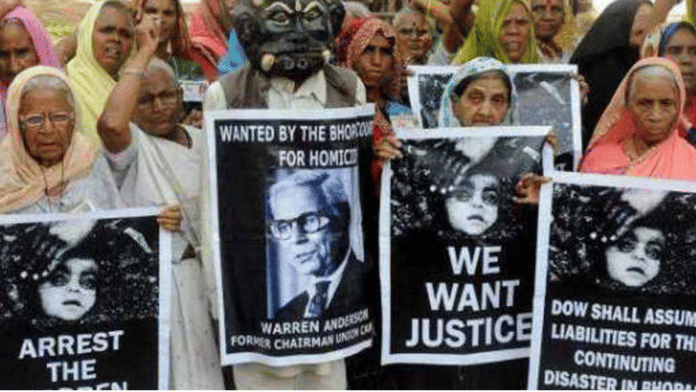In dismissing the central government’s curative petition for additional compensation for the 1984 Bhopal gas tragedy survivors, the Supreme Court bench has reignited the oldest point of debate in the movement. Who should pay compensation — the Indian government or Union Carbide Corporation/Dow Chemical Company?
In fact, this question lies at the heart of most environmental movements that are born out of catastrophes. The answer is the oldest dictum of ‘polluter pays’.
“The question of compensation can’t be raked up three decades after the settlement,” a five-judge Constitution bench of the Supreme Court said. In 2010, the central government had pleaded that the case be reopened and Dow pay approximately Rs 7,800 crore to the victims and survivors of the deadly gas tragedy. The plea was based on the argument that the deaths and diseases were not correctly assessed during the 1989 settlement. Successive Right to Information-retrieved documents showed that Union Carbide had literally provided the categories and the extent of injuries — the basis for the $470 million settlement given by the company — to the Indian government back then.
If the old case is reopened, then “it may open a Pandora’s box and will be detrimental to the claimants,” the court said.
Also read: The lazy way to remember the Bhopal Gas tragedy
What’s more, the court even asked the government to “dip into its own pocket” to pay more compensation.
Now, nothing could be more problematic than this. On the face of it, many may argue that instead of waiting forever for the less likely event of Dow coughing up more money, the Indian government should just step up and provide for its own citizens. After all, it is the government’s primary responsibility to take care of the survivors. And the survivors have suffered long enough, so the government should just pay and close the matter once and for all.
But this would just mean that the burden will be borne by guiltless taxpayers who had no role in the gas tragedy. Why penalise Indian people for the sins of an American company?
It also would mean that India gives up on its own polluter pays law, an internationally followed principle. India’s pollution law was a direct outcome of the tragedy, which killed 8,000 people immediately (and nearly 25,000 over the years) and permanently injured around 1,50,000.
Also read: Abdul Jabbar, Bhopal gas tragedy’s oldest activist, turned ailing survivors into warriors
‘Polluter pays’ vs charity
The commonly accepted polluter pays principle has been deployed as the central argument in several cases — from the 1997 Calcutta tanneries pollution case to the 2016 Shell Offshore oil spill in the Gulf of Mexico.
Dow has again and again said that by the time it acquired Union Carbide in 2001, the full and final out-of-court settlement had already been made to survivors (in 1989). There was nothing left to be done at that time and the government had also accepted it. But that position is untenable and ignores the civil and criminal cases pending in Indian courts, the survivors have said over time. They have also said that when Dow bought the company, it also acquired the environmental liabilities of the clean-up of the factory site in Bhopal.
In fact, when RTI documents emerged in 2007 stating Ratan Tata had allegedly told Planning Commission chief Montek Singh Ahluwalia that he would like to offer to clean up the factory site, survivor groups rejected it.
Again, it was based on the polluter pays principle, followed in both the US and India. They wanted Dow to clean up the site. However, it should not be seen as an act of charity but as an issue of culpability.
The survivors’ organisations in Bhopal criticised the Supreme Court bench’s dismissal on Tuesday and called it a judicial assault on their constitutional and legal rights. They also complained that their arguments were only heard for 45 minutes by the court whereas the counsel for Union Carbide was given ample time. They mockingly called it ‘fugitive entitlement doctrine’.
Rama Lakshmi is the Editor, Opinion at ThePrint. She is also the curator of the Remember Bhopal Museum. The museum has been temporarily closed due to a fund shortage.Views are personal.
(Edited by Humra Laeeq)






